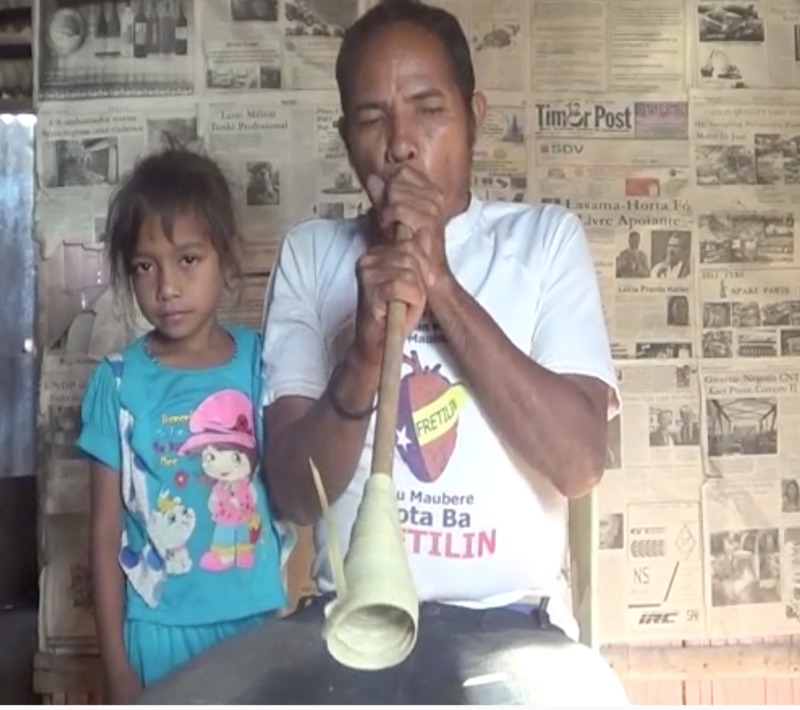Dublin Core
Title
Fara-Fara (trombeta; bamboo trumpet) - Aldeia Codo
Subject
Americo Marques Cabral toka fara-fara
Americo Marques Cabral plays the fara-fara
Americo Marques Cabral plays the fara-fara
Description
TETUM
Fara-fara mak instrumentu hanesan trombeta no atu hanesan ho keko, maibé parte diferente mak ibun-fatin. Fara-fara uza pipa au naruk to'o 1.5m nomos ai-tahan akadiru mak uza hodi halo bentuk kuhus no monta ba bamboo nia rohan ida, hanesan ho keko. Ibun-fatin ko'a diagonál no ai-tahan akadiru maran ida hatama ba laran no kesi metin.
Bainhira toka instrumentu múzika ida-ne'e tenke kaer ho rohan ida tun ba rai no huu iis boot ba laran. Presiza aten-book forte loos atu bele halo lian boot. Instrumentu ida-ne'e uza atu hata'uk manu-fuik hodi sira la han natar no toos.
ENGLISH
Fara-fara is a trumpet-like instrument built similarly to the keko, with a distinction being with the mouthpiece and reed. The fara-fara has a bamboo tube body around 1.5m in length and a cone trumpet made out of palm which is attached to the end of the instrument, like with the keko. The mouthpiece is cut diagonally, over which a small leaf-shaped piece of dried palm leaf is inserted to function as the reed, held in place in a slit made in the top of the bamboo tube.
The instrument is played by holding the instrument pointing downwards, and blowing a long extended breath. Strong lungs are needed to blow loudly. The instrument is used to scare away birds from eating rice fields and other crops.
In these videos, Americo Marques Cabral demonstrates how to make and play the fara-fara in aldeia Codo, sub-district Lautem.
Fara-fara mak instrumentu hanesan trombeta no atu hanesan ho keko, maibé parte diferente mak ibun-fatin. Fara-fara uza pipa au naruk to'o 1.5m nomos ai-tahan akadiru mak uza hodi halo bentuk kuhus no monta ba bamboo nia rohan ida, hanesan ho keko. Ibun-fatin ko'a diagonál no ai-tahan akadiru maran ida hatama ba laran no kesi metin.
Bainhira toka instrumentu múzika ida-ne'e tenke kaer ho rohan ida tun ba rai no huu iis boot ba laran. Presiza aten-book forte loos atu bele halo lian boot. Instrumentu ida-ne'e uza atu hata'uk manu-fuik hodi sira la han natar no toos.
ENGLISH
Fara-fara is a trumpet-like instrument built similarly to the keko, with a distinction being with the mouthpiece and reed. The fara-fara has a bamboo tube body around 1.5m in length and a cone trumpet made out of palm which is attached to the end of the instrument, like with the keko. The mouthpiece is cut diagonally, over which a small leaf-shaped piece of dried palm leaf is inserted to function as the reed, held in place in a slit made in the top of the bamboo tube.
The instrument is played by holding the instrument pointing downwards, and blowing a long extended breath. Strong lungs are needed to blow loudly. The instrument is used to scare away birds from eating rice fields and other crops.
In these videos, Americo Marques Cabral demonstrates how to make and play the fara-fara in aldeia Codo, sub-district Lautem.
Creator
Many Hands International
Source
Preservation of Endangered Forms of Intangible Fataluku Cultural Expression Project
Date
23.07.2013
Rights
Video, photo and text rights: Many Hands International
Language
Fataluku
Coverage
Aldeia Codo, Suco Maina II
